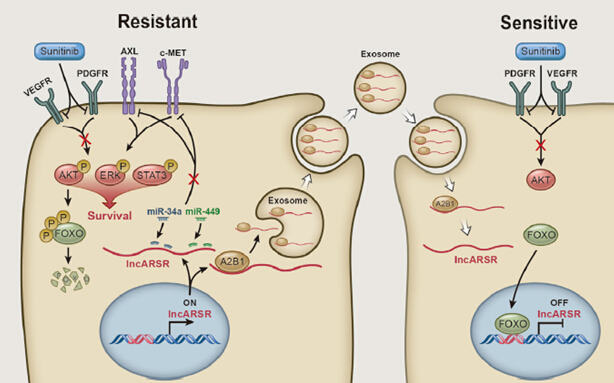
肿瘤抗药性一直是一个困扰肿瘤治疗的问题。随着研究的深入,研究者发现外泌体在肿瘤抗药性过程中发挥着重要功能,外泌体通常可以从抗药性肿瘤细胞通过传递miRNA来赋予药物敏感性受体肿瘤细胞抗药性。
lncRNA是近些年新兴的一个领域,随着研究的发展,越来越多的发挥内源性竞争RNA功能的lncRNA被发现。会不会有一些lncRNA通过外泌体发挥类似抗药性传递功能,目前还没有太多的认识。近日,Cancer Cell 在线发表了有第二军医大学王林辉、王红阳等人的最近研究成果,研究发现,肾上皮细胞癌中药物抵抗性肿瘤细胞会通过外泌体传递lncARSR赋予药物敏感性受体肿瘤细胞考药性。这一成果增加了大家对外泌体功能的认识,同时也扩展了lncRNA发挥功能的范围,是一篇十分具有指导性意义和临床意义的文章。
相关文献全文可到外泌体之家同名贴下载。
文章摘要:舒尼替尼耐药是晚期肾细胞癌(RCC)治疗的一个难点。了解这一耐药现象的机制并制定抑制舒尼替尼耐药的有效策略是目前临床应用中面对的重要问题。本文中,我们确定了一个与舒尼替尼抵抗相关的lncRNA(我们命名为lncARSR:lncRNA Activated in RCC with Sunitinib Resistance)。在RCC细胞中,lncARSR通过竞争性结合miR-34/miR-449来促进AXL和c-Met表达而赋予细胞舒尼替尼抗性。此外,具有生物活性的lncARSR可以被纳入外泌体并被传输到舒尼替尼敏感性RCC细胞,从而传播舒尼替尼抗性。对舒尼替尼抗药性RCC施加舒尼替尼的同时靶向关闭lncARAR或同时施加AXL/c-MET抑制剂可以有效缓解肿瘤细胞对舒尼替尼抵抗。因此,lncARSR可以用作预测和治疗舒尼替尼耐药的潜在治疗靶标。

Exosome-Transmitted lncARSR Promotes Sunitinib Resistance in Renal Cancer by Acting as a Competing Endogenous RNA
Abstract:Sunitinib resistance is a major challenge for advanced renal cell carcinoma (RCC). Understanding the underlying mechanisms and developing effective strategies against sunitinib resistance are highly desired in the clinic. Here we identified an lncRNA, named lncARSR (lncRNA Activated in RCC with Sunitinib Resistance), which correlated with clinically poor sunitinib response. lncARSR promoted sunitinib resistance via competitively binding miR-34/miR-449 to facilitate AXL and c-MET expression in RCC cells. Furthermore, bioactive lncARSR could be incorporated into exosomes and transmitted to sensitive cells, thus disseminating sunitinib resistance. Treatment of sunitinib-resistant RCC with locked nucleic acids targeting lncARSR or an AXL/c-MET inhibitor restored sunitinib response. Therefore, lncARSR may serve as a predictor and a potential therapeutic target for sunitinib resistance.
版权归外泌体之家所有,欢迎转载,但请注明出处和原文链接!




